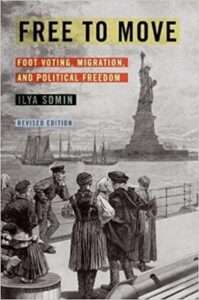The Volokh Conspiracy
Mostly law professors | Sometimes contrarian | Often libertarian | Always independent
Podcast Interview about my Book "Free to Move" with Hoover Institution Immigration Economist Tim Kane
We cover many issues related to the book, as well as freedom of movement more generally - both domestic and international.
Stanford University Hoover Institution immigration economist Tim Kane recently posted this podcast of an interview we did about the revised edition of my book Free to Move: Foot Voting, Migration, and Political Freedom. In the podcast we discuss a number of issues raised in the book and much else related to both domestic and international "voting with with your feet." Among other things, we cover my own family's story of immigration (which I recounted in more detail here), how my grandfather (an artillery officer in the Soviet army during World War II) was detained by the secret police for the "crime" of being cut off behind enemy lines, Frederick Douglass's 1869 defense of migration rights, parallels between right-wing hostility to international migration and (admittedly less severe) left-wing skepticism about domestic foot voting, and the danger that pandemic-era migration restrictions might become a new normal.
The podcast is part of Kane's "Why America?" series on immigration. Previous episodes include interviews with Parag Khanna, David Henderson, Ayaan Hirsi Ali, and others. I should mention that I very much look forward to reading Tim Kane's own forthcoming book on immigration policy, The Immigrant Superpower.
This podcast was recorded in November, before the new edition of my book was actually published. Thus, some of the information about its availability is a bit of out of date. It is now available on Amazon (albeit temporarily out of stock because the first printing apparently sold out), and on the Oxford University Press website. If you purchase it at the Oxford UP site, you can use coupon code ALAUTHC4 to get a 30% discount. There is also a Kindle version (priced at just $9.99). As with the first edition, 50% of all royalties go to causes benefiting refugees.



Show Comments (3)